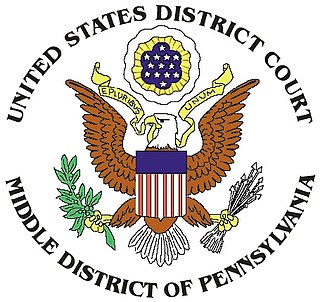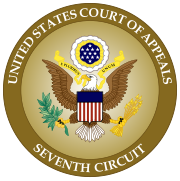Same-sex marriage has been legally recognized in the U.S. state of Florida since January 6, 2015, as a result of Brenner v. Scott, the lead case on the issue. In this case, a U.S. district court ruled the state's same-sex marriage ban unconstitutional on August 21, 2014. The order was stayed temporarily; state attempts at extending the stay failed, with the U.S. Supreme Court denying further extension on December 19, 2014.
Same-sex marriage has been legally recognized in the U.S. state of Wisconsin since October 6, 2014, upon the resolution of a lawsuit challenging the state's ban on same-sex marriage. On October 6, the U.S. Supreme Court refused to hear an appeal of an appellate court ruling in Wolf v. Walker that had found Wisconsin's ban on same-sex marriage unconstitutional. The appellate court issued its order prohibiting enforcement of the state's ban on same-sex marriage the next day and Wisconsin counties began issuing marriage licenses to same-sex couples immediately.
Same-sex marriage in Colorado has been legally recognized since October 7, 2014. Colorado's state constitutional ban on same-sex marriage was struck down in state district court on July 9, 2014, and by the U.S. District Court for the District of Colorado on July 23, 2014. The Tenth Circuit Court of Appeals had already made similar rulings with respect to such bans in Utah on June 25 and Oklahoma on July 18, which are binding precedents on courts in Colorado.
Same-sex marriage has been legal in the U.S. state of Alabama since June 26, 2015, after the U.S. Supreme Court's ruling in Obergefell v. Hodges, though not all counties participated, taking advantage of an exemption dating from the Civil Rights Era that allowed counties to avoid performing interracial marriages. On August 29, 2019, the state changed its marriage law, replacing the option of counties issuing marriage licenses and performing ceremonies with the requirement of counties issuing and recording marriage certificates. All counties complied, including with interracial and same-sex couples.
Same-sex marriage has been legally recognized in the U.S. state of Indiana since October 6, 2014. The state had previously restricted marriage to different-sex couples by statute in 1986. By legislation passed in 1997, it denied recognition to same-sex relationships established in other jurisdictions. A lawsuit challenging the state's refusal to grant marriage licenses to same-sex couples, Baskin v. Bogan, won a favorable ruling from the U.S. District Court for the Southern District of Indiana on June 25, 2014. Until the U.S. Court of Appeals for the Seventh Circuit granted an emergency stay of the district court's ruling on June 27, most Indiana counties issued marriage licenses to same-sex couples. The Court of Appeals affirmed the district court's ruling in Baskin on September 4. A ruling in Bowling v. Pence stated that the state must recognize same-sex marriages performed out-of-state and the decision was stayed until the Circuit ruled on the merits in similar cases. It also stated that the ruling would remain stayed if the circuit court stayed its decision in the related cases.

Sevcik v. Sandoval is the lead case that successfully challenged Nevada's denial of same-sex marriage as mandated by that state's constitution and statutory law. The plaintiffs' complaint was initially filed in the U.S. District Court for the District of Nevada on April 10, 2012, on behalf of several couples denied marriage licenses. These couples challenged the denial on the basis of the U.S. Constitution's Fourteenth Amendment guarantee of equal protection.
Same-sex marriage in South Dakota has been legal since June 26, 2015 when the U.S. Supreme Court ruled in Obergefell v. Hodges that the U.S. Constitution guarantees same-sex couples the right to marry. Attorney General Marty Jackley issued a statement critical of the ruling but said South Dakota is obligated to comply and the state would recognize same-sex marriages.
Same-sex marriage in Kansas became legal following the U.S. Supreme Court decision in Obergefell v. Hodges on June 26, 2015, which found the denial of marriage rights to same-sex couples unconstitutional. By June 30, all 31 judicial districts and all 105 Kansas counties were issuing marriage licenses to same-sex couples or had agreed to do so. Kansas state agencies initially delayed recognition of same-sex marriages for purposes including but not limited to changing names, ascribing health benefits and filing joint tax returns, but began doing so on July 6.
This is a list of notable events in the history of LGBT rights that took place in the year 2014.
Tanco v. Haslam was the lead case in the dispute of same-sex marriage in Tennessee. A U.S. District Court granted a preliminary injunction requiring the state to recognize the marriages of the plaintiffs, three same-sex couples. The court found the equal protection analysis used in Bourke v. Beshear, a case dealing with a comparable Kentucky statute "especially persuasive." On April 25, 2014, that injunction was stayed by the Sixth Circuit Court of Appeals. Tanco was appealed to the Sixth Circuit, which reversed the district court and upheld Tennessee's refusal to recognize same-sex marriages from other jurisdictions on November 6.

Geiger v. Kitzhaber is a decision by the U.S. District Court for the District of Oregon that requires Oregon to allow same-sex couples to marry and to recognize same-sex marriages established in other jurisdictions. The decision arose from two consolidated cases that alleged that Oregon's constitutional ban on same-sex marriage, Article 15, § 5, and all related marriage statutes, violate the Due Process Clause and the Equal Protection Clause of the 14th Amendment to the United States Constitution. Among the several defendants, Attorney General Ellen Rosenblum filed appearances in the case to defend Oregon's position, but declined to defend the constitutionality of the bans and ordered state agencies to recognize the validity of same-sex marriages established elsewhere.
Same-sex marriage in Mississippi has been legal since June 26, 2015. On November 25, 2014, U.S. District Court Judge Carlton W. Reeves of the District Court for Southern Mississippi, ruled Mississippi's ban on same-sex marriage unconstitutional. Enforcement of his ruling stayed pending appeal to the Fifth Circuit Court of Appeals. On June 26, 2015, the U.S. Supreme Court ruled in Obergefell v. Hodges that the denial of marriage rights to same-sex couples is unconstitutional under the Constitution of the United States. On June 29, Attorney General Jim Hood ordered clerks to issue marriage licenses to same-sex couples. On July 1, the Fifth Circuit lifted its stay and Judge Reeves ordered an end to Mississippi's enforcement of its same-sex marriage ban. However, until July 2, 2015, several counties in Mississippi continued to refuse to issue marriage licenses, including DeSoto, Jasper, Jones, Newton, Pontotoc, Simpson and Yalobusha.

Whitewood v. Wolf is the federal lawsuit that successfully challenged the Pennsylvania Marriage Laws, as amended in 1996 to ban same-sex marriage. The district court's decision in May 2014 held that the Marriage Laws violated the Due Process and Equal Protection clauses of the United States Constitution. Same-sex couples immediately sought and received marriage licenses and the decision was not appealed. One county clerk sought repeatedly without success to intervene to defend the law.

De Leon v. Perry was a federal lawsuit challenging Texas marriage law, specifically the state's constitutional ban on same-sex marriage and corresponding statutes. A U.S. district court ruled in favor of the plaintiff same-sex couples on February 26, 2014, granting their motion for a preliminary injunction. The state defendants filed an interlocutory appeal before the United States Court of Appeals for the Fifth Circuit, as the disposition on the motion was not a final ruling in the case. On April 14, 2014, the plaintiffs filed a motion for an expedited hearing, which was denied on May 21, 2014. The plaintiffs filed another motion for an expedited hearing on October 6, 2014, after the Supreme Court of the United States denied appeals in other marriage equality cases, and the motion was granted on October 7, 2014, setting a hearing for November 2014. However, on October 27, 2014, the Fifth Circuit set oral arguments for January 9, 2015.

Latta v. Otter is a case initiated in 2013 in U.S. federal court by plaintiffs seeking to prevent the state of Idaho from enforcing its ban on same-sex marriage. The plaintiffs won in U.S. District Court. The case was appealed to the Ninth Circuit Court of Appeals, which heard this together with two related cases–Jackson v. Abercrombie, and Sevcik v. Sandoval.

Wolf v. Walker is a federal lawsuit filed in February 2014 that challenged Wisconsin's refusal to grant marriage licenses to same-sex couples, its refusal to recognize same-sex marriages established in other jurisdictions, and related statutes. In June 2014, Judge Barbara Crabb of the U.S. District Court for the Western District of Wisconsin ruled for the plaintiffs. And in the week before she stayed her decision county clerks in 60 of the state's 72 counties issued marriage licenses to same-sex couples and some performed marriage ceremonies for them. The state appealed her decision to the Seventh Circuit Court of Appeals, which affirmed her opinion in a unanimous decision on September 4. The state requested a writ of certiorari from the U.S. Supreme Court, which was denied on October 6. Same-sex marriages resumed after the Seventh Circuit issued its mandate the next day.

Burns v. Hickenlooper is a lawsuit filed on July 1, 2014, in federal district court in Colorado, challenging that state's denial of marriage rights to same-sex couples. The plaintiffs' complaint alleged that the defendants have violated the Fourteenth Amendment by denying plaintiffs the fundamental right of marriage. The defendants agreed with the substance of the plaintiffs' case, but asked the district court to stay implementation of any order requiring Colorado to alter enforcement of its ban pending the outcome of other litigation. After the district court declined to grant more than a one-month stay on July 23, the state's governor and attorney general appealed and won a stay from the Tenth Circuit Court of Appeals on August 21. Following U.S. Supreme Court action in other cases, on October 8 they asked the Tenth Circuit to dismiss their appeal and lift the stay, which would effectively legalize same-sex marriage in Colorado.
In Brenner v. Scott and its companion case, Grimsley v. Scott, a U.S. district court found Florida's constitutional and statutory same-sex marriage bans unconstitutional. On August 21, 2014, the court issued a preliminary injunction that prevents that state from enforcing its bans and then stayed its injunction until stays are lifted in the three same-sex marriage cases then petitioning for a writ of certiorari in the U.S. Supreme Court–Bostic, Bishop, and Kitchen–and for 91 days thereafter. When the district court's preliminary injunction took effect on January 6, 2015, enforcement of Florida's bans on same-sex marriage ended.
On September 4, 2014 a three-judge panel of the Seventh Circuit Court of Appeals unanimously upheld district court rulings striking down same-sex marriage bans in Indiana, and Wisconsin, just nine days after the court heard oral arguments. The Seventh Circuit consists of Illinois, Indiana, and Wisconsin. Same-sex marriage was already legal in Illinois before the Circuit Court's decision. Same-sex marriages were performed in Indiana and Wisconsin after their bans were struck down by district courts and before those decisions were stayed. Recognition of out-of-state same-sex marriage was possibly de jure legal in Indiana until Baskin v. Bogan was stayed by the Seventh Circuit. On October 6, 2014, the Supreme Court of the United States denied cert, legalizing same-marriage in both Indiana and Wisconsin. As a result, same-sex marriage is legal in every state within the circuit.
Same-sex marriage was legalized in the U.S. state of Georgia on June 26, 2015, by the U.S. Supreme Court's ruling in the case of Obergefell v. Hodges. Attorney General Sam Olens said Georgia would "adhere to the ruling of the Court". The first couple wed just minutes after the ruling was handed down.







